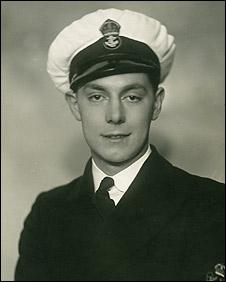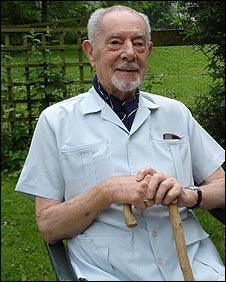Dunkirk 'shame' recalled by WWII veteran
- Published

Harold Biles has lived with his Dunkirk memories for 70 years
BBC world affairs correspondent Peter Biles has been talking to his father, Harold, about his recollections of the Dunkirk evacuation.
For 70 years, my father has lived with the shame of what happened to his ship, HMS Hebe, in June 1940.
During the evacuation of Dunkirk, he was the chief engine room artificer on board the Hebe, a minesweeper deployed to Dover as a control vessel.
The Hebe crossed the Channel to Dunkirk three times during those chaotic days between 27 May and 4 June.
"It was torrid, dangerous and nerve-wracking with all-day long German air attacks", says Harold Biles who marked his 28th birthday during the height of the bombardment.
"The Hebe was lying about 200 metres off the beach at Dunkirk, and there was just a seething mass of soldiers. All we knew was that we were on the water, they were on the beach and were trying to get to us.
"There was constant bombing and shellfire. We just used to wait for nightfall when there was a relaxation, and we could perhaps get some sleep."
In the early hours of 29 May 1940, the captain of HMS Hebe sent a gig ashore to the beach at Dunkirk. It was to collect Lord John Gort, the commander-in- chief of the British Expeditionary Force and take him to England.
"As we sped back to Dover, I remember seeing Lord Gort standing in the waist of the ship, holding the guardrail to offset the rise and swell of the waves. He was resplendent in his red-trimmed uniform, but he was motionless, with his head sunk to his chest".
"It was not for him to receive any acclaim for the evacuation of some 330,000 men and saving them from Nazi POW camps. In his eyes, there was only defeat. He had lost an army."

Harold Biles
The German bombardment, the trauma and the fatigue were taking a toll on the crew of HMS Hebe, and no doubt other ships involved in the evacuation.
My father describes how on the morning of 1 June, he witnessed the first signs of what we now know to be post-traumatic stress, but in those days was sometimes referred to as a "lack of moral fibre".
"We were embarking more stores and ammunition back in Dover. An RAF plane flying low overhead was the starting point. A seaman looked up, screamed and fell into convulsions with hysteria. It was contagious and he was joined by three or four others.
"Later in the day an order was issued, amazing and ill judged. Anybody feeling the stress of the last week was told to leave the ship and assemble on the dockside in preparation for going to hospital.
"About 20 men left the ship and I can still see their grins as they trooped over the gangway. The majority were malingerers but in fairness, the prospect of that final trip was frightening as the Germans were almost on the French beaches."
The captain of the Hebe sent for Harold Biles as the Chief Engineer, and the Coxswain.
"We both had to tell him that the ship was so depleted of crew that a further sailing was impossible. And so we remained alongside while other craft made the trip, some never to return."
To my father's dismay, HMS Hebe played no further part in Operation Dynamo.
"This was the greatest blow which sometimes I feel to this day," he says, on the eve of his 98th birthday.